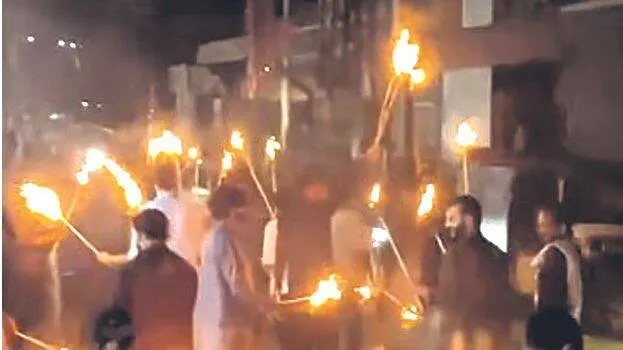

KARACHI: People in Pakistan-occupied Kashmir (PoK) have launched widespread protests against the government of Pakistan, accusing it of neglect and denying them their basic rights. The demonstrations turned violent when armed workers of the Muslim Conference party—backed by the Pakistani Army and its intelligence agency ISI—opened fire on the protesters, killing two and injuring 22 others. Videos show gunmen arriving in cars and shooting at crowds. Reports also say the army itself fired at protesters, creating a lawless situation in the region.
The incident took place on Monday in Muzaffarabad. Hundreds of people took to the streets under the banner of the Awami Action Committee (AAC), demanding their rights and protesting against Prime Minister Shehbaz Sharif’s government. Shops and markets remained closed, and transport came to a standstill. Demonstrations spread across Mirpur, Kotli, and Neelum districts.
The unrest follows a deadly airstrike by the Pakistan Air Force in Khyber Pakhtunkhwa province, which killed 30 people, including women and children. While the military claimed it targeted militant hideouts, the bombs struck civilian areas. Opposition parties, including Imran Khan’s PTI, intensified protests against the government’s actions, which further inspired people in PoK to rise up.
"Patience has run out"
The protesters have put forward 38 demands, including the cancellation of 12 legislative seats reserved for Kashmiri refugees, implementation of subsidies, and measures to tackle inflation. They argue that the reserved seats allow Islamabad to interfere unnecessarily in PoK’s politics. "The people’s patience has run out," AAC leaders said, warning of stronger agitation if their demands are ignored.
Security forces to suppress uprising
To suppress the uprising, thousands of paramilitary Rangers have been brought in from Punjab province, along with an additional 1,000 troops from Islamabad. Armed soldiers are patrolling the streets, and internet access has been restricted. Similar protests had erupted earlier in May over human rights violations in the region.
“For more than 70 years, our basic rights have been denied. Either the government grants us those rights, or it must be ready to face people’s anger.”
– Shaukat Nawaz Mir, AAC leader